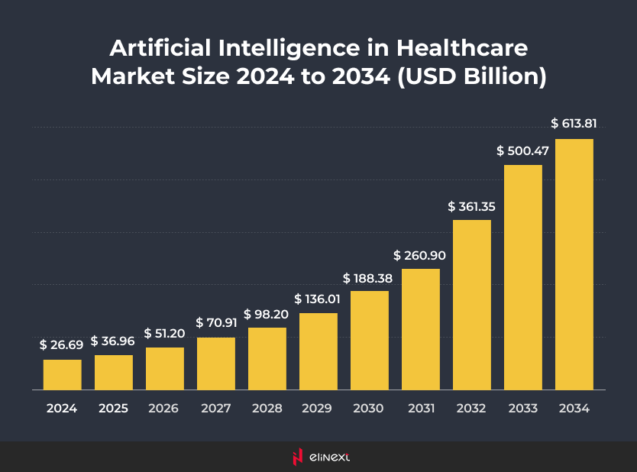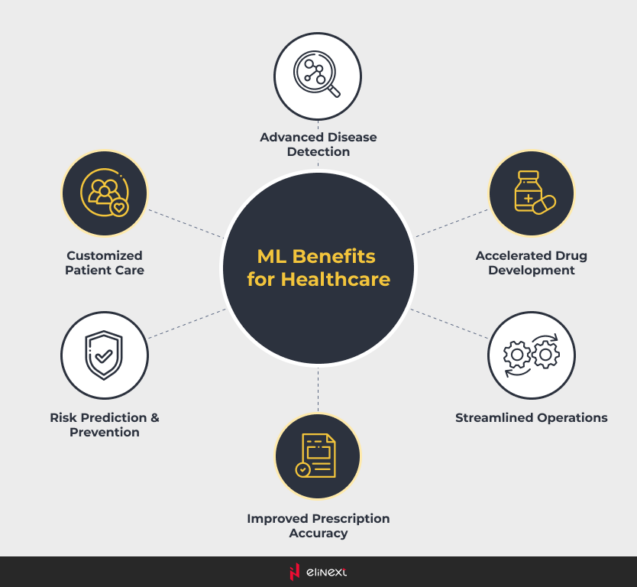The intersection of AI and mental health is gaining traction as the demand for effective mental health solutions continues to rise. Machine learning solutions are at the forefront, revolutionizing how mental health care is delivered. The market for mental health technology is expanding rapidly, driven by the need for personalized and scalable interventions. Additionally, custom healthcare software development is enabling the creation of tailored applications that harness machine learning to analyze data and improve patient outcomes, making mental health support more accessible and effective than ever before.
Different healthcare analytic solutions, such as mental health platforms, bots, and machine learning and mental health apps achieved very good results: they were cheaper, easy to use, didn’t require the patients to go anywhere, and allowed higher engagement.

The Use of Machine learning in Mental Health
How do artificial intelligence solutions and machine learning fit in with ML in mental health tech?
AI for mental health is revolutionizing how we understand and treat emotional well-being. By leveraging ML in mental health, practitioners can analyze vast amounts of data to identify patterns and predict mental health crises. This technology enhances early intervention, personalizes treatment plans, and improves patient outcomes, offering new hope in mental health care. It can then be used in several ways:
Developing treatment plans
Mental health machine learning is transforming care by analyzing data to uncover patterns and predict crises. The use of ML in mental health allows for early interventions and personalized treatment plans, ultimately improving patient outcomes and providing new hope for emotional well-being.
Predicting crises
Mental health machine learning aids clinicians in crafting better treatment plans by analyzing vast data. With ML in mental health, machines identify effective treatments, key biomarkers, and disorder sub-types, personalizing care beyond traditional averages and enhancing tracking of treatment effectiveness.
Kintsugi, a mindful talk therapy software, uses machine learning algorithms to detect depression and anxiety signs by speech biomarkers.
Patient behavior modification
In the discussion of mental health vs machine learning, patient behavior modification can be enhanced through AI. By analyzing data, machine learning can identify patterns that help tailor interventions, promoting healthier behaviors before issues escalate.
Virtual nursing
Machine learning in mental health is revolutionizing AI for mental health through virtual nursing. AI-driven platforms provide real-time support, monitor patient progress, and personalize care, enhancing accessibility and outcomes.
Medical imaging
mHealth app development is leveraging AI in mental health to enhance medical imaging techniques. By integrating AI, these apps can analyze imaging data for early detection of mental health issues, improving diagnostic accuracy and enabling timely interventions for better patient outcomes.
Accurate diagnostics
Machine learning in mental health is transforming machine learning and mental health by enabling more accurate diagnostics. By analyzing patient data, algorithms can identify patterns linked to disorders, ensuring timely and precise diagnoses that lead to effective treatment plans and better patient outcomes.
Some examples of widely used ML-based mental health apps
Explore some widely used ML-based mental health apps that harness the power of algorithms to provide personalized support, track emotional well-being, and offer coping strategies to enhance mental health care.
-
Woebot
Woebot is an example of AI and mental health bot. The Woebot app utilizes machine learning in mental health to offer users AI-driven support, delivering personalized conversations and coping strategies for emotional well-being.
-
Moodpath
The Moodpath app showcases the power of machine learning and mental health by analyzing user inputs to gauge emotional well-being. It generates personalized insights and offers tailored resources, empowering users to understand their mental health journey and promoting proactive self-care strategies.
-
Wysa
Wysa is an AI-driven mental health app that offers users a virtual mental health coach. It provides evidence-based tools, chat support, and mindfulness exercises, helping individuals manage stress and emotional well-being effectively.
-
Mindstrong
Mindstrong leverages AI and mental health to provide real-time insights into users’ emotional well-being. By analyzing smartphone usage patterns, it helps identify mental health trends and offers personalized support to enhance self-care.
Benefits of machine learning in mental health
Advanced Disease Detection
Machine learning in mental health enables advanced disease detection by analyzing vast datasets to identify patterns and early signs of mental health disorders. This helps healthcare providers intervene sooner, improving patient outcomes and personalized treatment plans.
Customized Patient Care
ML in mental health facilitates customized patient care by analyzing individual data to tailor treatment plans. This personalization enhances therapy effectiveness, ensuring that patients receive the most suitable interventions for their unique needs.
Risk Prediction and Prevention
Mental health machine learning enhances risk prediction and prevention by detecting early warning signs, allowing for timely interventions and reducing crisis occurrences.
Accelerated Drug Development
AI in mental health accelerates drug development by analyzing vast datasets to identify potential drug candidates faster. This streamlines the research process, reduces costs, and ultimately brings effective treatments to patients more quickly.
Streamlined Healthcare Operations
Mental health machine learning streamlines healthcare operations by automating administrative tasks, optimizing resource allocation, and enhancing patient flow. This improves efficiency, reduces costs, and allows providers to focus more on patient care.
Improved Prescription Accuracy
ML in mental health enhances prescription accuracy by analyzing patient data, predicting responses to medications, and minimizing adverse effects for personalized treatment.

What are the challenges of using machine learning in Mental HealthTech?
Using machine learning in Mental HealthTech presents several challenges. Firstly, data privacy is a significant concern, as sensitive patient information must be protected from breaches. Secondly, data bias can lead to inaccurate predictions, affecting treatment effectiveness.
Additionally, the interpretability of algorithms is crucial; stakeholders need to understand how decisions are made. Lastly, integrating these technologies within existing healthcare systems can be complex and costly, hindering widespread adoption.
Data Privacy and Security
Machine learning and mental health raise significant concerns regarding data privacy and security, as sensitive patient information must be rigorously protected to prevent breaches.
Data Quality and Accessibility
Data quality and accessibility pose significant challenges in Mental HealthTech. Inconsistent or incomplete data can hinder effective machine learning models, while limited access to diverse datasets restricts their applicability and effectiveness.
Integration with Existing Systems
Integrating machine learning into existing mental health systems can be complex. Compatibility issues, data silos, and resistance to change may hinder seamless implementation and effective utilization of AI solutions.
Clinician and Patient Trust
Building trust in machine learning applications is crucial for clinicians and patients. Concerns about accuracy, transparency, and data privacy can impede acceptance and hinder the effective use of AI tools in mental health care.
What is the nearest future Mental HealthTech?
The nearest future of Mental HealthTech lies in advanced patient management solutions that leverage AI and data analytics. Innovations will enable real-time monitoring of mental health through wearables and apps, allowing for timely interventions. These solutions will focus on personalized care, utilizing predictive analytics to identify risks and recommend tailored treatments. Enhanced data integration will empower clinicians and patients alike, fostering a more proactive approach to mental well-being.
Conclusion
In conclusion, the intersection of mental health vs machine learning presents a transformative opportunity for enhanced care and personalized treatment. While challenges such as data quality, integration, and trust remain, the potential benefits of utilizing machine learning in mental health are immense. As technology evolves, it is crucial to address these challenges collaboratively, ensuring that machine learning tools are developed ethically and effectively to support mental health professionals and patients alike in their journey towards improved mental well-being.
FAQ
How does ML ensure patient privacy in mental health applications?
Machine learning (ML) ensures patient privacy in mental health applications through techniques like data anonymization, encryption, and secure data storage. By utilizing federated learning, ML models can be trained on decentralized data without exposing sensitive information, thus maintaining confidentiality and compliance with regulations.
What ethical concerns exist with ML in mental health?
Ethical concerns with machine learning (ML) in mental health include data privacy, algorithmic bias, and informed consent. Misuse of sensitive data can lead to breaches of confidentiality, while biased algorithms may exacerbate disparities in care. Ensuring transparency and accountability is crucial for ethical implementation.
How effective are ML tools in mental health care?
Machine learning (ML) tools in mental health care have proven effective in predicting patient outcomes, personalizing treatment plans, and identifying early warning signs of mental health issues. By analyzing large datasets, these tools enhance decision-making and improve overall patient care, leading to better mental health outcomes.









